Last updated: December 8, 2023
I was at the racetrack yesterday and overheard a conversation between two men that really got me thinking. One man said to the other, “The most important thing you can do when buying a racehorse is to make sure it has a solid pedigree. This made me think back to the most important tip I ever heard.
The most crucial factor to consider when buying a racehorse is its conformation. I’ve found it critical to determine whether or not a horse will be successful on the track. A racehorse without sound conformation will likely end up uncompetitive and often injured.
If you’re a horse racing enthusiast, the idea of buying your own racehorse may have crossed your mind. It’s an exciting prospect, but it’s also a serious commitment. Here are some things to consider before taking the plunge.
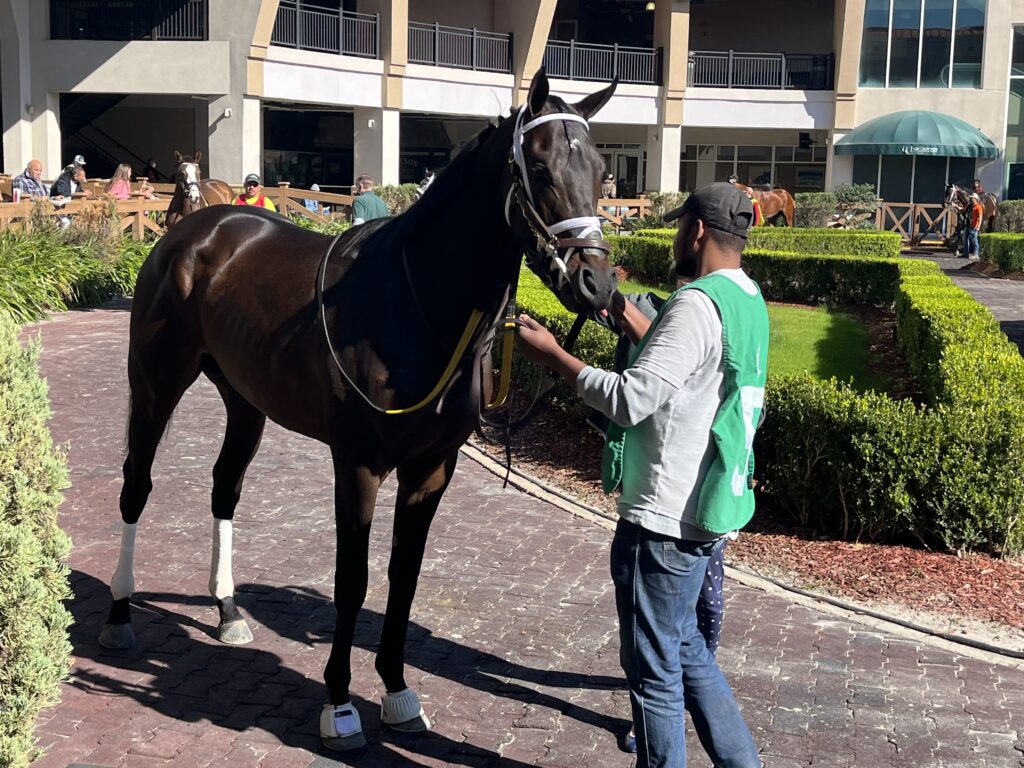
Good conformation is critical for performance horses.
In the horse racing world, one of the most important aspects of a successful horse is having good conformation. This means that the horse is correctly put together so that all its parts work well together.
In order to achieve this level of conformation, many breeders spend hours upon hours examining horses and selecting only the very best for breeding. The reason correct conformation is so crucial for racehorses is that it affects nearly every part of their performance on the track.
The horse that many consider having perfect conformation is Secretariat. However, some horses succeed without ideal physical structure; Seabiscuit is an excellent example of this.
I took a chance on a horse with a turned-out foot, he was well-bred, and the owner wanted to get rid of him cheap. I put him in training, and he did really well.
But poor conformation often leads to training injuries, lameness, and even poor muscle development. As you can see, having a horse with good conformation is key to a successful racing career.
Below is a YouTube video that provides some helpful tips about Thoroughbred conformation.
Everyone at a horse sale looks for the same thing, a horse with excellent conformation and an impressive pedigree. But horses that meet these criteria are typically the sales toppers and beyond the price range of most buyers.
So you have to accept less than perfect. Do you go with a horse with a less impressive pedigree, or are you willing to buy a horse with imperfect conformation? Well, this depends.
At a yearling auction, I found a filly with the body type I love; she was perfectly straight and had nice strong-looking bones. However, when I checked out her lineage in the sales catalog, it had no black type (no stakes winners).
Regardless of her poor pedigree, I decided to bid on her and won the bid for $2,000. She went on to have an outstanding racing career and became a successful broodmare. Success in horse racing is often luck, but you can reduce the risks of loss.
Most racing prospects have a decent pedigree, or they wouldn’t be in the sale, and the same can be said about conformation. Knowing acceptable risks and the market price of horses are a couple of reasons you need help from an experienced horseman.
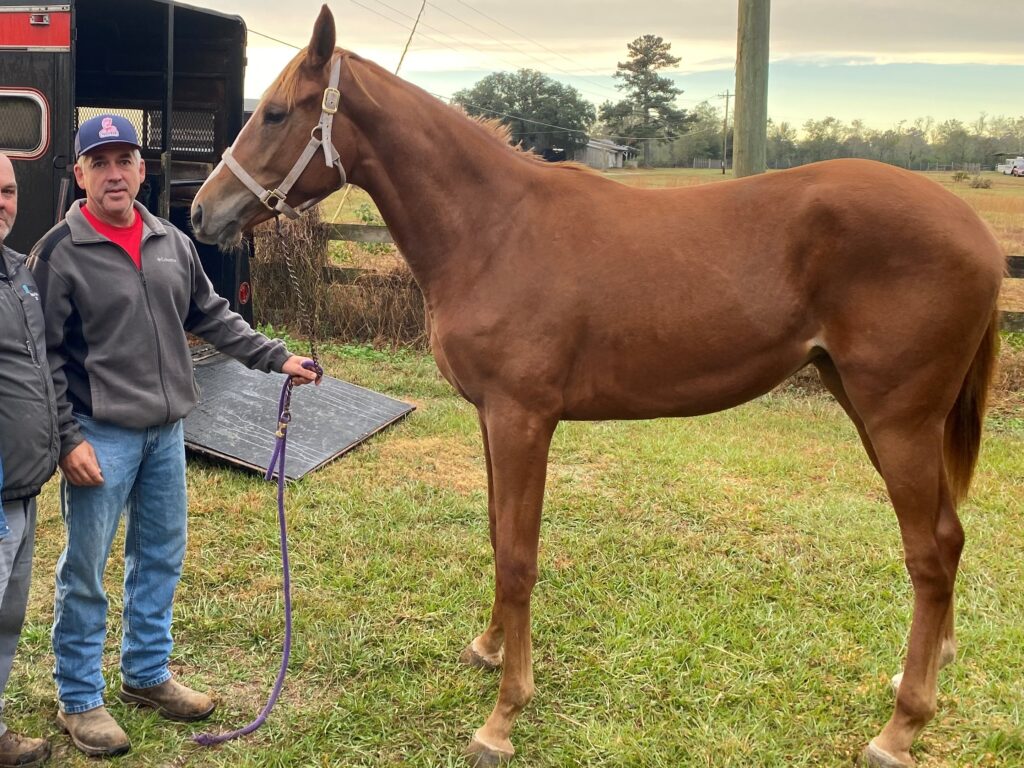
When buying a racehorse, rely on people with horse racing experience
Purchasing a racehorse can be an exciting experience, but it’s important to remember that this is a serious investment. Always make sure to work with an experienced trainer or someone with racehorse experience who can help you choose the right horse and guide you through the purchasing process.
When making this purchase, there are many things to consider, such as the horse’s temperament, age, and health. By working with someone who knows what they’re doing, you can be sure that you are making a wise investment in your future.
So don’t hesitate to reach out for help – it could make all the difference between finding the perfect horse and getting stuck with an “also-ran.”
Caveat: Be sure you can trust the person you’re working with. Soon after I got into horse racing, I attended a “mixed sale” auction in Oklahoma. While checking out the horses before the auction, I noticed an exceptional-looking mare with a weanling by her side.
Earlier in the day, I ran into a very successful racehorse breeder and family friend, so I decided to ask him to check out the mare and let me know what he thought about her.
He agreed, and we pulled the mare from her stall and looked her over thoroughly; he pointed out many faults, most I couldn’t see, and I told him so. His recommendation is, don’t bid on this mare; she is trouble.
You can probably guess how this story ends; he bought the mare. It was heartbreaking. Even though the man and I weren’t close, he was one of my uncle’s best friends and a person I trusted. The moral of the story, be sure you can trust the people you ask for help.
Below is a picture of a local breeder’s fillies. He sells his horses out of the pasture, and they’re all out of successful mares and good studs.
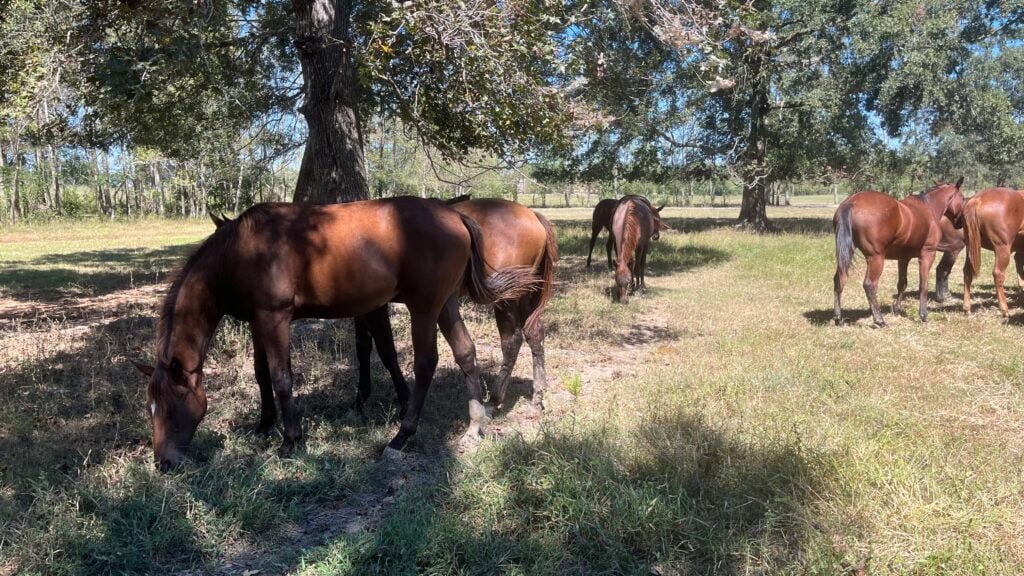
Research bloodlines and breeding before making any decisions
When picking a racehorse, it’s essential to do your research first. Not all horses are created equal, and some bloodlines are better than others. By understanding the lineages of different horses, you can make a more informed choice about which horse is best suited to succeed.
So, before making any decisions, be sure to educate yourself on the subject. Buying a horse with a great pedigree does have a better chance of success; however, they likely won’t stand up to the rigors of training without good conformation. Take note that horses run in the Kentucky Derby every year with less than stellar lineage.
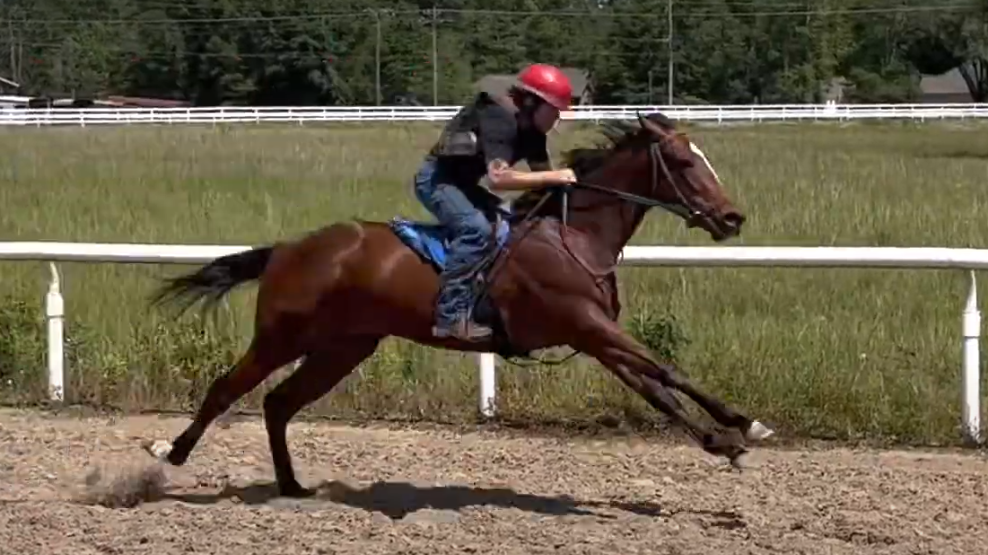
Make sure the horse is physically fit and sound before purchasing
Many people enjoy the excitement of horse racing, but not everyone knows how to pick a racehorse. It is vital to make sure the horse is physically fit and sound before spending any money on it. Generally, the rules used when buying a pleasure horse apply when purchasing a racehorse.
The horse’s physical health should be one of your top priorities, so be sure to have a veterinarian examine it thoroughly. If everything checks out, then you can start thinking about the other factors that will make or break your racing career.
Not all physical issues are deal-breakers; I got a nice horse cheap because it was limping. The owner thought the horse had foundered. However, I believed it had thrush. Once I got the horse home, I treated his foot, and he was running and winning within six months.
Ask lots of questions and take your time when choosing a racehorse
When it comes to choosing a racehorse, there is no room for error. This is why it’s important to ask lots of questions and take your time when making your selection. By doing so, you’ll be sure to find the perfect horse for you. So don’t rush into anything – take your time and ask around until you find the right horse for you.
Call the breeder, talk to owners of the prospects’ siblings, or speak to the jockeys that rode horses. There is a wealth of information you can learn if you just ask. I was able to get a good deal on a yearling because its mother never raced.
To some people, this was a negative mark on the young prospect. However, when I called around and spoke to the mother’s owner and trainer, I found out she was hurt in an accident before she was old enough to race.
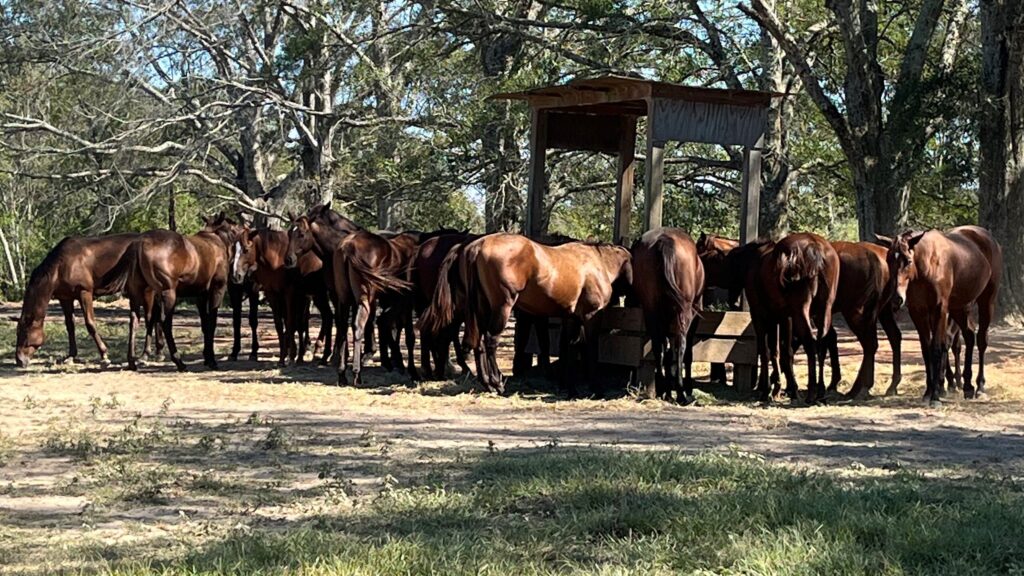
Considerations before buying a racehorse.
If you’re considering buying a racehorse, you should keep a few things in mind. First, racehorses can be very expensive, so make sure you have the money to cover their costs, training fees, vet bills, and other associated expenses such as insurance, transportation, and farrier costs.
Do you have a place to board your horse during the off-season or when it needs a rest? Do you know the typical costs of owning a horse, not in training? You don’t want to pay daily training fees when your horse isn’t ready to race.
You’ll also need to find a good and honest trainer to help you get your horse ready for the track. And be prepared to lose races – racing is a competitive sport, and the chances of your horse making money are slim.
Some people buy racehorses as an investment; however, this is very risky, and unless you need a tax write-off, I wouldn’t recommend it.
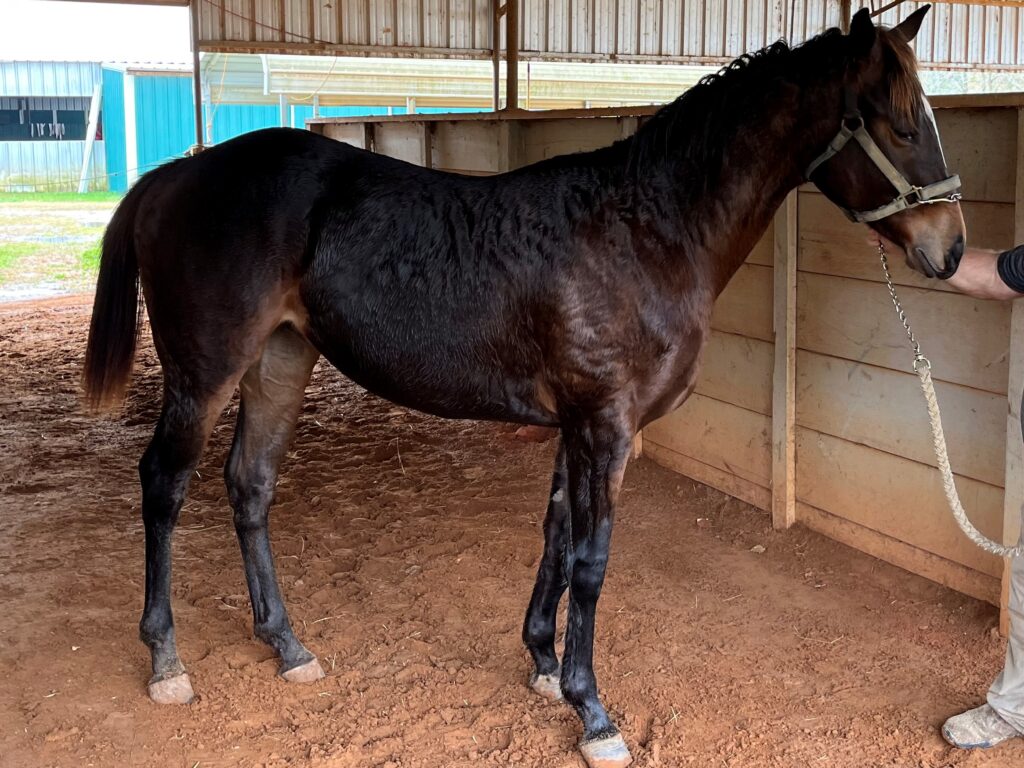
Conclusion
I’ve heard plenty of tips about buying a racehorse, such as “Buy the best one you can afford,” “Never buy a racehorse on credit,” and “Pedigree is essential.” But for me, the most important tip I ever heard was “buy a horse with good conformation.”

About the Author: Miles Henry
Lifelong Horseman | Racehorse Owner | Published Author
Miles Henry brings over 25 years of hands-on experience training and owning Thoroughbred racehorses. Raised with Quarter Horses and Appaloosas, he’s spent a lifetime learning from horses—on the track, in the barn, and in the field. Today, he runs a small but successful racing stable in Louisiana and shares real-world insights on HorseRacingSense.com, helping horse owners, fans, and bettors navigate the sport with confidence.
📚 Books: View Miles’s books on Amazon »
🎧 Podcast Guest: Animal Tales Ep. 32 |
YouTube Interview
📩 Newsletter: Sign up for racing tips and horse care advice »
🔗 Follow Miles:
Twitter |
Facebook |
YouTube



Edward rodriguez
Sunday 26th of November 2023
Unsound horses will eat you up when the vets show up , I living proof their fees are going sky high and trainers will allow beware.
Bil Bradley
Monday 29th of January 2024
Yes, you are correct.